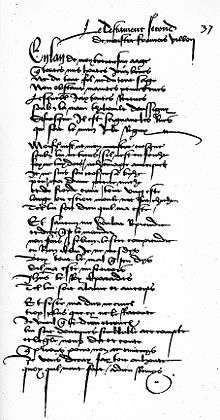Le Testament
Le Testament is a collection of poetry composed in 1461 by François Villon. Le Testament, comprising over twenty essentially independent poems in octosyllabic verse, consists of a series of fixed-form poems, namely 16 ballades and three rondeaux,[1] and is recognized as a gem of medieval literature.
Analysis

The 2,023 lines of the Testament are marked by the immediate prospect of death by hanging and frequently describe other forms of misery and death. It mixes reflections on the passing of time, bitter derision, invective, and religious fervor. This mixed tone of tragic sincerity stands in contrast to the other poets of the time.
In one of these poems Ballade des dames du temps jadis ("Ballad of the Ladies of Times Past"), each stanza and the concluding envoi asks after the fate of various celebrated women, including Héloise and Joan of Arc, and ends with the same semi-ironic question:
Dictes moy ou n'en quel pays |
Tell me where, in which country |
This same "Ballade des dames du temps jadis" was famously translated into English in 1870 by Dante Gabriel Rossetti as "Ballade of Dead Ladies." Rossetti translated the refrain as "But where are the snows of yester-year?"[3]
Poems
Poems included in Le Testament are:
- Ballade des dames du temps jadis (1458–59) (see also main article: Ballade des dames du temps jadis)
- Ballade des seigneurs du temps jadis
- Ballade en vieux language françois
- Les regrets de la belle Heaulmiere
- Ballade de la Belle Heaulmière aux filles de joie
- Double ballade sur le mesme propos
- Ballade pour prier Nostre Dame
- Ballade à s'amie
- Lay ou rondeau
- Ballade pour Jean Cotart
- Ballade pour Robert d'Estouteville
- Ballade des langues ennuieuses
- Les Contredits de Franc Gontier
- Ballade des femmes de Paris
- Ballade de la Grosse Margot
- Belle leçon aux enfants perdus
- Ballade de bonne doctrine
- Rondeau ou bergeronnette
- Épitaphe
- Rondeau
- Ballade de conclusion
See also
References
-
- Fein, David (1997), "6 The Testament: The Ballades", François Villon Revisited, New York: Twayne, ISBN 0805745645,
Villon has interspersed a series of fixed-form poems, 16 ballades and three rondeaux, throughout the Testament.
- Fein, David (1997), "6 The Testament: The Ballades", François Villon Revisited, New York: Twayne, ISBN 0805745645,
- Villon, "Tide and Undertow", poems of various languages translated by Anthony Weir, 1975
- Rossetti, Dante Gabriel (1872) [original French poem Ballade des dames du temps jadis 1461 by François Villon], "Three Translations From François Villon, 1450. I. The Ballad of Dead Ladies", Poems (1870): Sixth Edition, French poems translated 1869 by Dante Gabriel Rossetti (6 ed.), London: F. S. Ellis, p. 177, retrieved 2013-07-23
Further reading
- Complete works at Project Gutenberg
- Francois Villon's The Legacy & The Testament by Louis Simpson
- François Villon: Poems, translated by David Georgi
External links
| Wikisource has original text related to this article: |